You Tube 1950's Song With Mr Dj Would You Read My Request
xxx. United Together (1980)
In one sense, United Together is symbolic of what went wrong with Franklin'due south career in the early 80s – it's a high-gloss MOR ballad, a world abroad from the music that made her proper name. But you can't go away from the fact that she sounds astonishing, investing the lyric with undeniable power.
29. Holdin' On (2003)
Her last album (after 23 years) on Arista, So Damn Happy made more than concessions to Franklin's past than its immediate predecessors: she played piano, wrote material and sounded more comfy in her surround. You can hear information technology on Holdin' On, co-written and bundled by Mary J Blige, proof that her vocal ability was undiminished in her 60s.
28. State highway of Dearest (1985)
Laden with guest appearances, domicile to Sisters Are Doing It for Themselves, 1985's Who's Zoomin' Who restored Franklin to the charts. The anthology's production is very of its era: the 60s Motown pastiche Freeway of Love was remixed to appeal to "rock" – ie white – audiences. But it's such a fantastic vocal, it inappreciably matters: Franklin, meanwhile, sounds exuberant.
27. Information technology's Gonna Get a Bit Improve (1979)
Her audience seemed to think Franklin was lowering herself past making the disco anthology La Diva, but the reality is far meliorate than its wretched reputation suggests, as evidenced by her version of this Lalomie Washburn song, far too funky and robust to experience similar belated bandwagon-jumping.
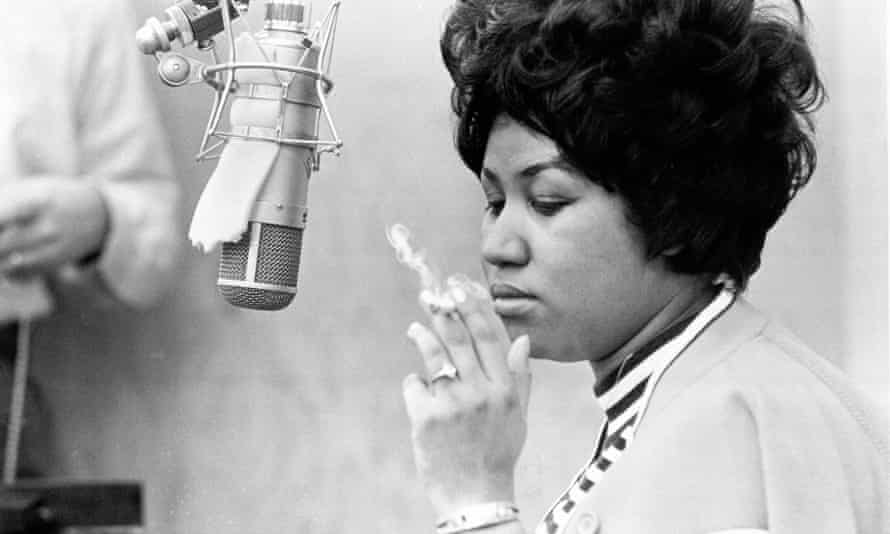
26. Something He Can Experience (1976)
The Curtis Mayfield-helmed soundtrack to the film Sparkle is an overlooked precious stone in Franklin's catalogue, his songs not bad, the lush proto-disco audio a delight. Something He Can Feel was supposed to be function of the repertoire of the 60s girl group at the centre of the movie, but information technology's too well-written and subtle to sound like pastiche.
25. I Never Loved a Man (The Way I Love You) (1967)
Finally allowed, past her new label Atlantic, to exercise whatever she wanted – "They just told me to sit at the piano and sing" – Franklin responded with the title track of her 10th album, a blues into which she appeared to pour all the hurting of her marriage to the appalling Ted White.
24. A Rose Is Still a Rose (1998)
The belatedly 90s effort to requite Franklin a hip-hop/neo soul-influenced makeover didn't really work, except on the album'southward Lauryn Hill-penned championship track. The crush and the lyrical references to "flossin'" are gimmicky, but the vocaliser sounds unfazed, delivering a coolly controlled performance.
23. Every Girl (Wants My Guy) (1983)
Franklin's early-80s albums don't get a lot of dearest. They are certainly not unimpeachable classics to match her late 60s/early 70s purple catamenia, but they're still studded with gems. From the Luther Vandross-produced LP Go Information technology Right, Every Daughter (Wants My Guy) is a fabulously sassy slice of mail-disco boogie.
22. Soulville (1964)
Columbia Records knew Franklin was talented, but not what to do with her, peppering her career with false starts. Occasionally, however, her total power was unleashed, equally here. A frantic have on Dinah Washington'south 1963 hitting, this is more than edgy and heady than the MOR and jazz-pop the label normally lumbered her with.
21. Night Life (1967)
Franklin completely inhabits Willie Nelson'due south song about his early on career, struggling at the bottom of Nashville's ladder. The bankroll perfectly conjures upward a dingy club at 3am, her performance switching between weariness and a weird kind of savor: "The dark life own't no good life, only you know it'south my life."
20. A Deeper Dear (1992)
Franklin's peachy excursion into house music – produced by Clivillés and Cole of C&C Music Factory fame – features a typically astonishing song over the relentless acme-of-the-dark groove. Picking up on the religious undercurrent of the lyrics, she shifts from scat singing to fervent gospel sermonising; its total ability is revealed on the a capella intro of C&C's Deeper Mix.
19. Young, Gifted and Blackness (1972)
Franklin was advised against taking on Nina Simone'south blackness power anthem. It was the organist Billy Preston who piped up that Franklin could "trounce it", and he was right: she took the intro to church building, extending it until information technology consumed half the song, smoothing out Simone's staccato functioning until it sounded exultant.
18. Sweet Bitter Love (1985)
Amid Who's Zoomin' Who's MTV-friendly sheen lurks a version of a Van McCoy ballad that Franklin had originally recorded in the 60s. If the new take isn't as dandy as the rough demo, her vocal is nevertheless wonderful, the runway itself a powerful link to her roots in the teeth of her 80s pop phase.
17. Concatenation of Fools (1967)
A song based entirely around 1 chord, Chain of Fools is really audacious. It should in theory exist a monotonal dirge, merely Franklin'due south soaring song and the tight mesh of guitar interplay between Joe Due south and Jimmy Johnson makes information technology hugely compelling. Moreover, she arranged information technology herself, uncredited.
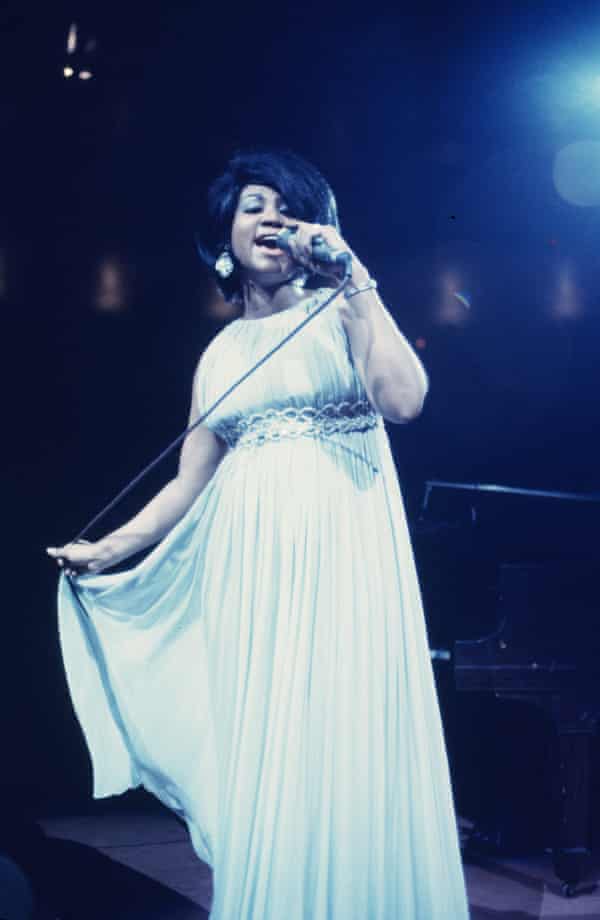
16. Mr DJ (v for the DJ) (1975)
Her album You is commonly pinpointed as the moment when Franklin'southward inventiveness stalled. In terms of cloth, it's not a patch on the previous year'south Allow Me in Your Life, simply the opening track Mr DJ is magic, a horn and phone call-and-response vocal-laden strut that defies anyone in earshot not to dance.
xv. Do Right Woman, Exercise Correct Man (1967)
The sessions for Franklin'southward offset Atlantic album were stormy; at one betoken they had to be abandoned after a row involving Ted Wright, leaving Do Right Woman, Do Right Human unfinished. Later, Franklin completed the vocal in one take. It's tempting to say you can tell: her functioning is calm but firm, precise and commanding.
14. The Weight (1969)
Perhaps the greatest of Franklin's unfailingly vivid reworkings of contemporary rock textile – encounter also her versions of Bridge Over Troubled H2o and Elton John's Border Song – her have on The Band's The Weight is tender land soul, with a gospel song that belies Franklin'south merits she had no thought what the lyrics were well-nigh.
13. Drown in My Own Tears (1967)
Even by Franklin's standards, the vocal on Drown in My Own Tears is exceptional, a summoning of pain and inconsolable misery that gradually gains momentum until information technology reaches a startling top of desperation iii minutes in as she repeatedly wails the word "drown" in a fashion that is genuinely chilling.
12. I Say a Little Prayer (1968)
Not for the first time, Franklin took someone else's hitting – a contempo 1000000-seller for Dionne Warwick – and fabricated it utterly her own. Initially released every bit a B-side, her version was far tougher, lacked the like shooting fish in a barrel-listening orchestration of the original and was later on acclaimed past 1-one-half of its writing team, Burt Bacharach, equally the definitive reading.
11. Call Me (1970)
Phone call Me was the only Franklin original on 1970's This Daughter's in Love With You, simply what an original: her piano playing pitched between soul and jazz, a pillowy – but not schmaltzy – orchestral organization past Arif Mardin, a vocal filled with longing and bruised optimism.
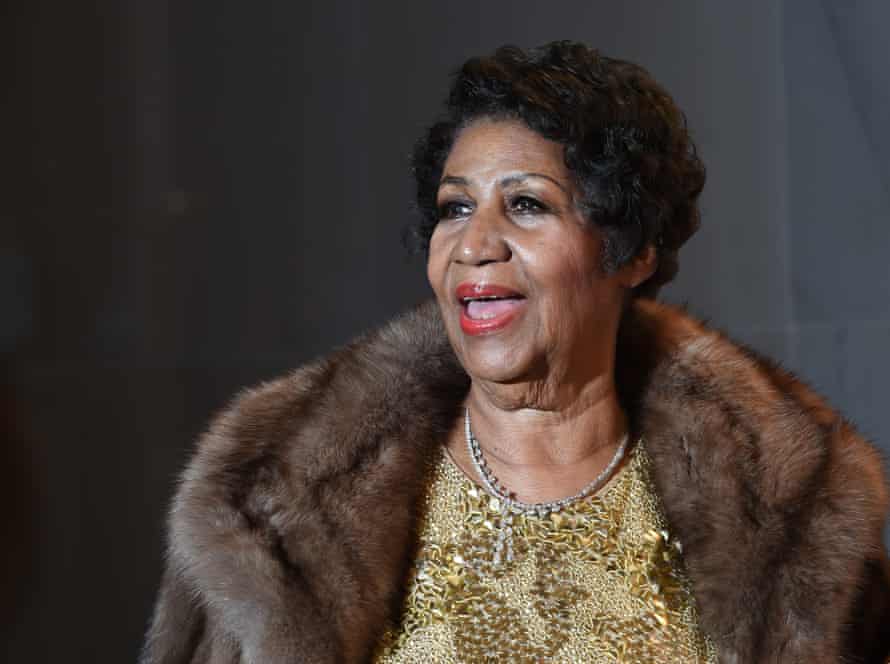
10. What Y'All Came to Do (2007)
Franklin'due south final decade saw some incredible alive performances – not least at the 2015 Kennedy Middle Honors – but, as she was beset by ill-health, her recorded output was patchy. Recorded as a contractual obligation, this duet with John Legend unexpectedly turned out triumphant: upfront, wildly funky, the all-time thing she had done in twenty years.
9. Until Y'all Come Dorsum to Me (That'southward What I'm Gonna Do) (1974)
Her sister Erma lauded Franklin's ability to "transform extreme hurting to farthermost dazzler", which is exactly what happens on this Stevie Wonder co-write. The song is well-nigh romantic obsession, but Franklin turns it into something transcendent and enraptured, her voice soft, the backing warm and attracting.
8. Angel (1973)
The combination of Franklin and Quincy Jones should have been triumphant, but 1973's Hey Now Hey brutal some way short of expectation. If it had all been as a great as Angel, it would have been a different story. Everything about the vocal is sublime, from the silky arrangement to Franklin's emotional shift from vulnerability to resolution.
7. Day Dreaming (1972)
Obviously about Franklin's affair with the Temptations singer Dennis Edwards, Day Dreaming is a fabulous piece of music. Languid and sexy, its wistful mood is ramped upward by Donny Hathaway's otherworldly electric piano, the scattered, abstract bursts of flute and a lengthy, slightly eerie beat-less outro.
half dozen. Spirit in the Dark (1970)
The battle between the sacred and the profane that lurked at the heart of soul music was captured on the cocky-penned title track of Franklin's 17th studio album, after sampled by Kanye West. Cute and episodic, Spirit in the Night'due south sound is pure gospel, but the lyrics imply more earthly pleasures.
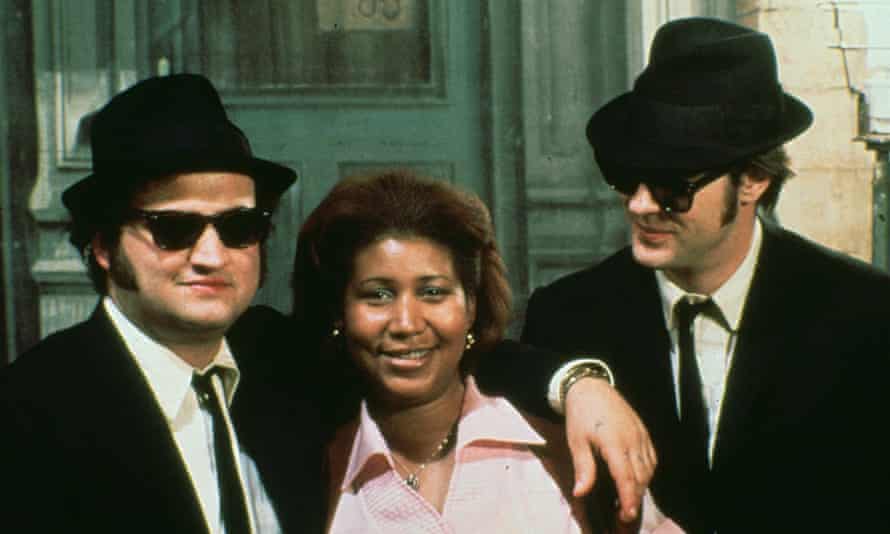
v. Call back (1968)
Ostensibly a song nearly a relationship that has descended into gaslighting, Think seems to be driven by something else entirely. Recorded a calendar week after Franklin sang at Martin Luther King's funeral, the repeated cry of "Freedom!" and the demand for listeners to "let yourself be free" conspicuously had other resonances, giving the song a fraught power and impact.
four. You Make Me Feel Like a Natural Woman (1967)
When Frankin's star finally rose, it did so at a startling speed. 4 months after Respect hit, a songwriting team as respected as Goffin and King were writing material only for her. Fifty years on, over-familiarity hasn't blunted the impact of her functioning: the way she shifts from the control of the verses to the euphoria of the chorus all the same sounds sublime.
3. Rock Steady (1972)
Initially at least, Franklin seemed imperiously capable of assimilating any new musical trend into her audio, as demonstrated by the self-penned Rock Steady, her killer response to funk. Information technology'south an exquisite tight-but-slinky groove, with a fabulous bassline, a vocal that manages to be raw simply perfectly controlled and an addictive telephone call-and-response chorus.
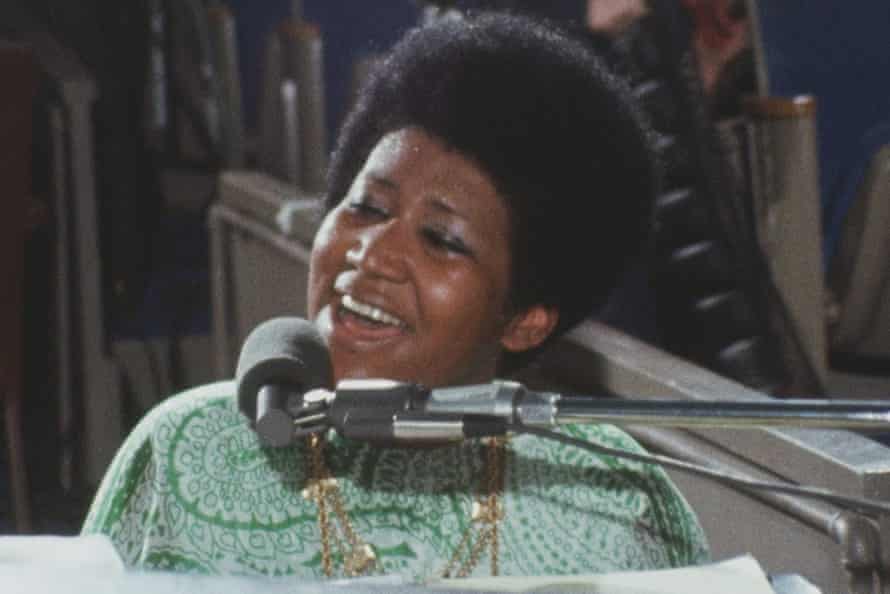
2. Amazing Grace (1972)
In reality, you could pick anything from 1972's Amazing Grace, the double live gospel fix that contains the most extraordinary vocal performances of Franklin'due south career. But the title runway might but be the most extraordinary of the lot, a display of potent, intuitive, shiver-inducing extemporisation that lasts for 10 minutes, without a second wasted.
1. Respect (1967)
Information technology wasn't merely that Franklin's version of Respect was simultaneously tougher and catchier than Otis Redding's original – the "Sock it to me" refrain and "R-E-S-P-E-C-T" hook were Franklin'southward additions – or that the song helped catapult her to stardom. It was that her performance completely changed the song's significant, from a human demanding fealty from his married woman to an assertive, ballsy demand for equality that could accept been practical to women's rights or black power, in the procedure helping to shift soul music into a new era when social consciousness blended with commerciality, an impossibly stiff combination. "The girl has taken that song from me," noted Redding, sagely. "From now on, it belongs to her."
Source: https://www.theguardian.com/culture/2019/nov/21/aretha-franklin-30-greatest-songs-ranked
0 Response to "You Tube 1950's Song With Mr Dj Would You Read My Request"
Post a Comment